 MyDogBreeds
MyDogBreeds Japanese Chin is originated from Japan but Abruzzenhund is originated from Italy. Japanese Chin may grow 46 cm / 18 inches shorter than Abruzzenhund. Japanese Chin may weigh 39 kg / 85 pounds lesser than Abruzzenhund. Both Japanese Chin and Abruzzenhund has almost same life span. Japanese Chin may have less litter size than Abruzzenhund. Both Japanese Chin and Abruzzenhund requires Moderate maintenance.
Japanese Chin is originated from Japan but Abruzzenhund is originated from Italy. Japanese Chin may grow 46 cm / 18 inches shorter than Abruzzenhund. Japanese Chin may weigh 39 kg / 85 pounds lesser than Abruzzenhund. Both Japanese Chin and Abruzzenhund has almost same life span. Japanese Chin may have less litter size than Abruzzenhund. Both Japanese Chin and Abruzzenhund requires Moderate maintenance.
 The Japanese Chin, also known as the Japanese Spaniel, has always been known for thousands of years as a dog with strong companion characteristics.
The Japanese Chin, also known as the Japanese Spaniel, has always been known for thousands of years as a dog with strong companion characteristics.
Hailing from Asia, he is also known as the Japanese Spaniel. In Japan, the Chin dogs are royalty and lapdogs, and while the exact origin of the Japanese Chin isn't quite clear, it is an ancient toy breed.
The first Japanese Chin was brought to America in 1882. The toy breed was recognized by the American Kennel Club in 1888, as a Japanese Spaniel. The AKC changed the breed name to the Japanese Chin in 1977.
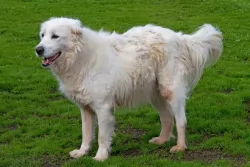 Abruzzenhund was established as an individual breed in the middle of the 20th century. They are descendant of the big, white Eastern sheepdogs which came to Europe 2000 years ago. Abruzzenhund is a mix of Turkish sheepdogs Akbash and Karabash, the Kuvac, Slovakian breed Hungarian breed, Komondor, and a French sheepdog Pyrenean Mountain Dog. Those dogs were much bigger than today’s breed. Abruzzenhund is still not very popular breed, but it is very common in Great Britain and Italy. They have been used as guard dogs, hunting dogs, and working dogs because they are very brave and strong.
Abruzzenhund was established as an individual breed in the middle of the 20th century. They are descendant of the big, white Eastern sheepdogs which came to Europe 2000 years ago. Abruzzenhund is a mix of Turkish sheepdogs Akbash and Karabash, the Kuvac, Slovakian breed Hungarian breed, Komondor, and a French sheepdog Pyrenean Mountain Dog. Those dogs were much bigger than today’s breed. Abruzzenhund is still not very popular breed, but it is very common in Great Britain and Italy. They have been used as guard dogs, hunting dogs, and working dogs because they are very brave and strong.
 As a small sized dog, the oriental looking Japanese Chin stands at about 20 to 27cm in height and weighs roughly 2 to 6kg. He has a large round head with big brown eyes and a short muzzle. The ears are long and feathery and the tail is long and held up over the back.
As a small sized dog, the oriental looking Japanese Chin stands at about 20 to 27cm in height and weighs roughly 2 to 6kg. He has a large round head with big brown eyes and a short muzzle. The ears are long and feathery and the tail is long and held up over the back.
The long silky single coat is either white and red or white and black or it can be tri-colored too – white, black and reddish-tan.
The Japanese Chin is a small, evenly tempered dog and the toy-size dog, according to people who have owned him as a pet, say he has some cat-like features – the ability to leap and the ability to wash himself similar to what a cat does.
He is also a typical lap dog liking nothing more than to lie in your lap and be petted. He just loves being with his human family and his smallness allows him to fit well into city- or country life.
He is an intelligent dog. He is small but strong-willed and that is why both you and him will benefit from having him trained and socialized as he becomes more amicable and obedient.
Social, jaunty and content, he is everyone’s friend and will be a suitable playmate for children, being loving and devoted to his entire family. They make great therapy dogs as he has the knack of being sensitive to the feelings of people and adjusts his mannerisms to suit the people he is with.
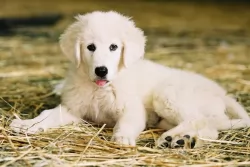 A height of Abruzzenhund variates between 60-73 cm, males are slightly bigger than females. While the weight is 30-45kg, again, males are heavier than females.
A height of Abruzzenhund variates between 60-73 cm, males are slightly bigger than females. While the weight is 30-45kg, again, males are heavier than females.
Abruzzenhund lifespan is between 11-13 years, but since these dogs don’t have any weaknesses and don’t tend to get sick, they can live longer with a proper care and adequate food and training.
Litter size of Abruzzenhund depends, but as any large breed, they usually have 6-9 puppies. And that is a very good considering size of the breed.
Abruzzenhund is not the only name of this breed. There are more names that you might hear. You can hear names like Maremma, Pastore, Abruzzese, Cane da Pastore, Maremmano- Abruzzese, Italian Sheepdog, and many similar names. Basically, they sound similar but there are differences.
Abruzzenhund is a friendly dog, but it is very powerful. Very strong jaw with a scissors bite makes them very strong. They have small but intelligent eyes, usually dark colored. The undercoat is dense, while the coat is white with segments of ivory to white yellow. Their long undercoat and coat make them winter resistant.
 The Japanese Chin is just longing to be your special friend. When you treat him with the love and care he deserves, you'll discover that he is a sweet, gentle companion who will be loyal and loving to his human family.
The Japanese Chin is just longing to be your special friend. When you treat him with the love and care he deserves, you'll discover that he is a sweet, gentle companion who will be loyal and loving to his human family.
He is a quiet pet and intelligent enough to be trained and socialized so that he is obedient and ready to please. Although he doesn't bark much, he makes quite a few other noises such as wheezing, snorting and snorting. He makes up for it by being entertaining and loving towards you so that you life is brighter just by having him in it.
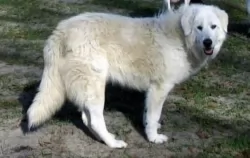 Abruzzenhund is a very well-balanced breed who loves spending time with other animals and people. They have a very good temper. They love being around families, and they are very gentle with children. It is important to train Abruzzenhund properly because the dog of that size should be a leader. A human with a strong character should train this breed. Training is important because they tend to make their own decisions which can be bad sometimes.
Abruzzenhund is a very well-balanced breed who loves spending time with other animals and people. They have a very good temper. They love being around families, and they are very gentle with children. It is important to train Abruzzenhund properly because the dog of that size should be a leader. A human with a strong character should train this breed. Training is important because they tend to make their own decisions which can be bad sometimes.
 There are a few health issues with your Japanese Chin that are worth knowing about such as hypoglycemia, cataracts and heart murmurs. Allergies and dental issues also need to be checked.
There are a few health issues with your Japanese Chin that are worth knowing about such as hypoglycemia, cataracts and heart murmurs. Allergies and dental issues also need to be checked.
Dog breeds with the flattened face always battle with dental-, eye and breathing problems. With good care however, your Japanese Chin can reach anything from 10 – 12 years of age.
Murmurs come about because of a disturbance in the blood flow and which can produce an audible noise. If your dog's murmur is associated with structural heart disease, your dog may display signs of congestive heart failure and he'll be weak for instance and be coughing.
When your dog gets to the vet, the course of treatment will be determined on the type of heart murmur. Luckily puppies with low grade murmurs often grow out of it but if you have an adult dog, routine diagnostic imaging may be recommended by your vet.
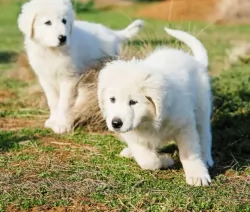 A great thing about Abruzzenhund is that they are very healthy dogs. They don’t have any chronical health problems, so if you are feeding your dog properly, with a lot of exercises they will not have any health problems. It is also important to check genetics of the dog.
A great thing about Abruzzenhund is that they are very healthy dogs. They don’t have any chronical health problems, so if you are feeding your dog properly, with a lot of exercises they will not have any health problems. It is also important to check genetics of the dog.
 The Japanese Chin has a single coat, and a brush once or twice a week will keep the coat silky and untangled.
The Japanese Chin has a single coat, and a brush once or twice a week will keep the coat silky and untangled.
Check his ears for dirt and wax and try to wipe inside the ears, being very, very careful not to go deep into the ear to avoid damage.
Clip his nails and brush his teeth as small dogs are more prone to dental disease. Periodontal disease is preventable with dental cleaning. Dental disease starts when plaque sticks to the surface of the teeth. It hardens, spreads under the gum line and cause tissue damage. It also damages the immune system.
The Japanese Chin is an energetic dog and loves a game and a walk. It isn't the kind of dog that you will take on your hikes or swimming as it tends to huff and puff after a while from too much exercise, and more specifically in hot weather.
Dog experts say that a grain-free food is best for this kind of dog. Kibble which comes with lean protein and with plenty of vitamins and minerals such as taurine and carnitine is recommended. They are good for the joints, coat, heart and eyes. Japanese Chins can be prone to heart- and eye problems and kibble rich in omega 3 fatty acids will be good for the Chin for many excellent reasons.
If you're in any way uncertain about what to feed your Japanese Chin, speak to your vet as the type of food you feed your pet will determine how healthy he will be. Always ensure he has access to fresh, cool water.
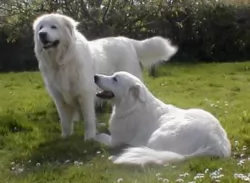 They learn very quickly, but it requires strong will and constant training to keep them happy. They are great working dogs, and with the positive training, they are amazing. It is very important that they follow rules and to keep them in balance with training.
They learn very quickly, but it requires strong will and constant training to keep them happy. They are great working dogs, and with the positive training, they are amazing. It is very important that they follow rules and to keep them in balance with training.
They can eat a lot of food, depend on their activity. High-Quality dog food twice a day for a grown dog is a must. While puppies should eat 3-5 times, smaller portions of food. The food is important especially for working dogs, they need up to 2000-3000Kcal per day. Abruzzenhund will enjoy eating meat with a lot of vegetables and oil.
They are not recommended for small house or apartment. They need big yard because they require a lot of space. During the winter they can be outside because of their coat, but during the summer they need to be in the shade with a lot of fresh water available anytime.
The coat should be brushed and groomed very often because they have a thick coat. There is a lot of dead and loose hair in it. During shedding, period takes even more time to groom your dog properly. They love and they need exercise. Mental exercise is important as physical. Every day walking, running, playing with other animals is an important part of dog's activity. When they get enough quality exercise, they will sleep in the house.